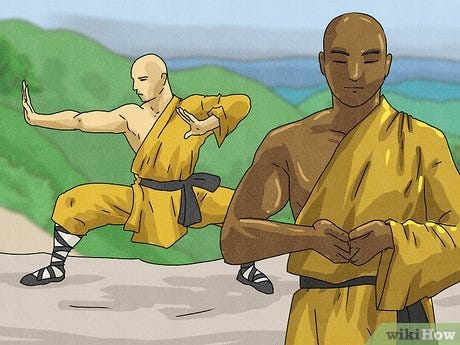The CEO Monk: Rise and Fall of Shaolin’s Modern Master
The monk who branded Shaolin—and broke it
We’ve all heard of the Shaolin monks and their temple. They’ve appeared in countless movies and are often what people picture when they think of Chinese martial arts.
But did you know it wasn’t always that way? Just a few decades ago, the temple was run-down, the monks had limited funds for its upkeep, and hardly anyone outside of China knew it even existed.
Then came one man: Liu Yingcheng (Buddhist name: Shi Yongxin). He brought the temple back to modern glory—but at a cost. Today, he’s under arrest for corruption and other crimes.
Why? Let’s find out!
长期担任少林寺住持的释永信正在接受中国当局调查,据少林寺发布的通告,他涉嫌挪用资金,与多名女性保持“不正当关系”并育有至少一名私生子。
少林寺 (Shàolínsì): Shaolin Temple
涉嫌 (shèxián): to be suspected of (a crime)
挪用资金 (nuóyòng zījīn): embezzlement of funds; misappropriation of funds
私生子 (sīshēngzǐ): illegitimate child; child born out of wedlock
Shi Yongxin, who has long served as the abbot of the Shaolin Temple, is under investigation by Chinese authorities. According to a notice issued by the temple, he is suspected of embezzling funds, maintaining “improper relationships” with multiple women, and fathering at least one illegitimate child.
这是中国最著名的僧人之一卷入的最新丑闻。释永信素以“佛门CEO”闻名,在他的努力下,这个位于中国中部、有1500年历史的古刹变成了国际旅游景点和全球品牌。
僧人 (sēngrén): monk
丑闻 (chǒuwén): scandal
素以…闻名 (sù yǐ... wénmíng): to be long known for...; to be famous for...
古刹 (gǔchà): ancient temple
This is the latest scandal involving one of China's most well-known monks. Shi Yongxin, known as the “CEO Monk,” helped turn this 1,500-year-old monastery in central China into an international tourist destination and a global brand.
中国佛教协会周一宣布注销释永信戒牒。该协会称他的行为“十分恶劣,严重败坏了佛教界的声誉,损害了出家人的形象”。
注销 (zhùxiāo): to cancel; to revoke
戒牒 (jièdié): monastic certificate; ordination certificate
声誉 (shēngyù): reputation; prestige
出家人 (chūjiārén): monk or nun (literally "one who has left home" for religious life)
On Monday, the Buddhist Association of China announced the cancellation of Shi Yongxin’s monastic certificate. The association said his actions were “extremely egregious,” severely damaging the reputation of the Buddhist community and tarnishing the image of ordained monks.
释永信1981年在河南省少林寺出家前俗名刘应成。他因让这座遭冷落数十年的古刹再现辉煌而受到赞誉,但也有人批评他把这里变得过度商业化。
俗名 (súmíng): secular name (name before becoming a monk/nun)
遭冷落 (zāo lěngluò): to be neglected; to be given the cold shoulder
辉煌 (huīhuáng): glorious; splendid
赞誉 (zànyù): praise; acclaim
商业化 (shāngyèhuà): commercialization
Before becoming a monk at the Shaolin Temple in Henan Province in 1981, Shi Yongxin’s secular name was Liu Yingcheng. He has been praised for revitalizing the long-neglected ancient temple, but also criticized for overly commercializing it.
尽管如此,他仍被认为是将“少林”品牌推向全球的关键人物,方式包括品牌授权和特许经营。他在海外开设武术学校,一度还想在澳大利亚建造一个耗资3亿美元的少林品牌豪华高尔夫度假村。在他的领导下,少林寺的商业版图横跨电影制作、药品销售等多个领域。
关键人物 (guānjiàn rénwù): key figure; pivotal person
品牌授权 (pǐnpái shòuquán): brand licensing
特许经营 (tèxǔ jīngyíng): franchising
豪华 (háohuá): luxurious
商业版图 (shāngyè bǎntú): business empire; commercial landscape
横跨 (héngkuà): to span across; to stretch over
Despite the controversy, he has been widely seen as the key figure in globalizing the “Shaolin” brand through licensing and franchising. He opened martial arts schools overseas and once planned to build a $300 million Shaolin-branded luxury golf resort in Australia. Under his leadership, the Shaolin Temple’s business empire expanded into film production, pharmaceutical sales, and more.
今天,这座寺院被改造为赚钱机器的痕迹随处可见。《纽约时报》记者近日实地探访看到,著名的少林武僧功夫表演以书法推销开场。主持人展示了三幅书法作品,每幅售价300元人民币,当场成功卖出了至少一幅。
赚钱机器 (zhuànqián jīqì): money-making machine
痕迹 (hénjì): trace; mark; sign
随处 (suíchù): everywhere; at every turn
Today, signs that the temple has been transformed into a money-making machine are everywhere. A recent visit by The New York Times revealed that the famous Shaolin monk kung fu performance begins with a calligraphy sales pitch. The host displayed three pieces, each priced at 300 RMB, and successfully sold at least one on the spot.
观众看完表演后需要经过狭窄的小道才能离开,小道两旁是销售各种商品的礼品店,它们不仅出售常规的旅游纪念品(如佛像、T恤、冰箱磁贴),还出售运动鞋、珠宝,以及拉布布。
狭窄 (xiázhǎi): narrow; cramped
冰箱磁贴 (bīngxiāng cítiē): fridge magnet
After the performance, visitors must pass through a narrow path lined with gift shops selling various goods — not only the usual tourist souvenirs like Buddha statues, T-shirts, and fridge magnets, but also sneakers, jewelry, and even rag dolls.

虽然能看到一些僧人在寺庙的大殿里诵经,但寺院里主要是游客和迎合游客需求的商家:小吃摊、电动观光车服务,以及招揽生意的导游。
诵经 (sòngjīng): to chant scriptures; to recite sutras
招揽生意 (zhāolǎn shēngyi): to solicit business; to attract customers
Although a few monks can still be seen chanting scriptures in the temple’s main hall, the majority of the temple grounds are filled with tourists and vendors catering to them: snack stalls, electric sightseeing car services, and tour guides hustling for business.
What do you think of Shi Yongxin? Do you think the Shaolin Temple would have survived without his business mindset? Is it possible to find a middle ground—commercializing China’s ancient history while still preserving its authenticity?
Antoine & Dorota










谢谢